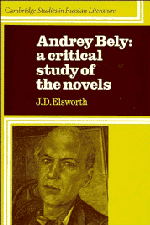Summary
Bely returned to Russia from Berlin in the autumn of 1923. His two years in emigration were a period of great distress, during which his relations with the anthroposophical movement in the West collapsed almost entirely. He was able to restore his own trust in and affection for Steiner himself at their last meeting in Stuttgart in March 1923, and did not change in his attachment to Steiner's ideas; but he repudiated the Anthroposophical Society as an institution, and argued later that the spiritual community anthroposophy sought was incompatible with any kind of real social organization. All social forms have the tendency to restrict and distort the development of the individual spirit.
That development remained his theme, both in the memoir literature where he traced it in his own personal life and the history of his generation, and in the fictional works in which it is embodied in fictional characters. It even underlies his critical studies, where his theories about the development of rhythm in literary art or of perspective in painting are based upon a conception of the spirit's increasing penetration of the secrets of nature, in parallel with its increasing liberation from the tyranny of static forms.
His Epopee was to be an epic of the spirit. If that is a contradiction in terms it is at all events a contradiction that corresponds to the identification of inner and outer worlds in Bely's thought, and to the experiments with genre that follow from it.
- Type
- Chapter
- Information
- Audrey BelyA Critical Study of the Novels, pp. 174 - 198Publisher: Cambridge University PressPrint publication year: 1983
- 1
- Cited by



